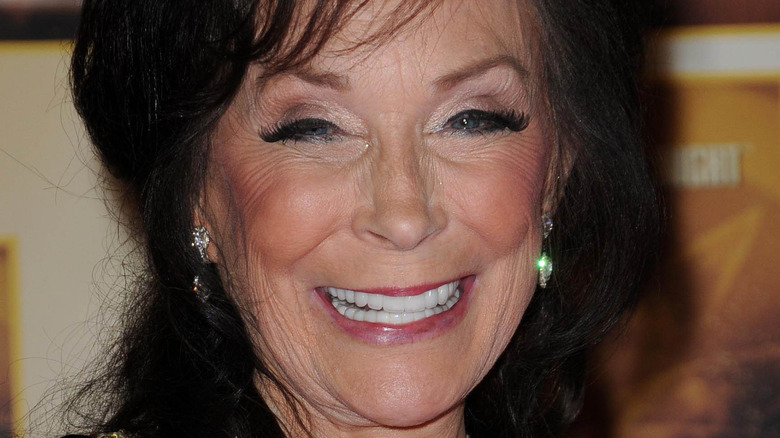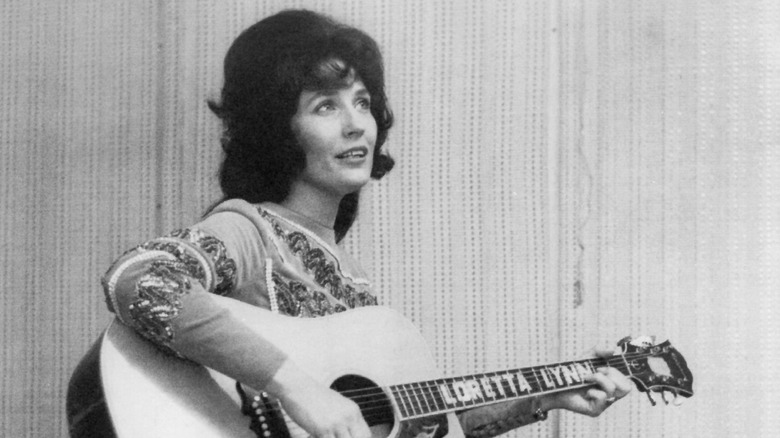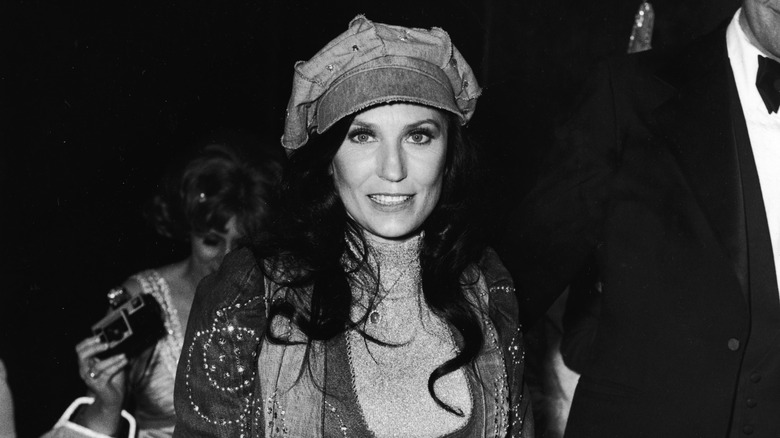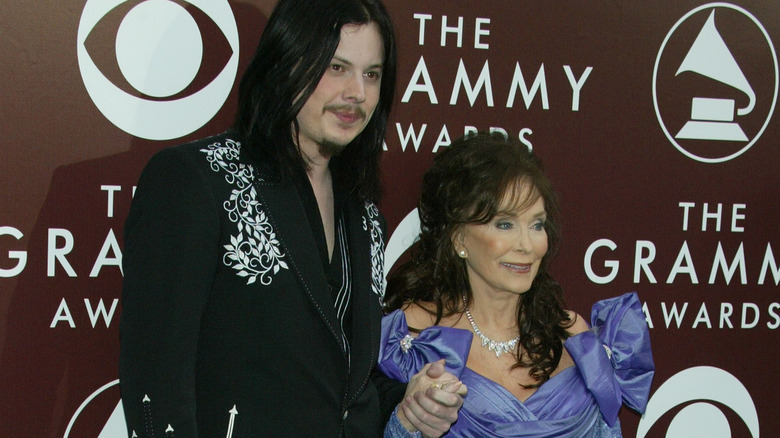The Heart-Wrenching Death Of Loretta Lynn
Country singing legend Loretta Lynn died on October 4, 2022, at the age of 90 (via The Washington Post). Her family provided a statement to the Associated Press, noting the legendary singer died at home.
As Loretta Lynn would later sing in her song (and biography, which was adapted into a movie), she was born a coal miner's daughter in a log cabin in Butcher Holler, Kentucky, on April 14, 1932, per History. She was the second of eight children; three of her siblings, Jay Lee Webb, Peggy Sue Wright, and Crystal Gayle, are also country singers. She sang in church as a child, and at the age of just 15, married Oliver "Mooney" Lynn, also known as Doolittle Lynn.
The couple moved to Custer, Washington, where job prospects were better for Mooney. Loretta Lynn had her first child at age 16 and had four children by the time she was 21. For her 26th birthday, her husband gave her a $17 guitar and encouraged her to sing and write songs. She began singing and playing guitar with bands at local clubs. She signed with Zero Records and wrote and recorded her first song, "I'm a Honky Tonk Girl," in 1960.
From 'Honky Tonk Girl' to country superstar
The Lynns traveled around to various radio stations, hand-delivering the "I'm a Honky Tonk Girl" single to DJs and sending it out to thousands more stations. The song went to No. 14 on the country charts, per AllMusic. Lynn made her first appearance on the Grand Ole Opry on September 17, 1960, as reported by the Country Music Hall of Fame. Lynn caught the attention of the Wilburn Brothers, a singing duo who owned a talent agency and music publishing house. They encouraged Lynn to relocate to Nashville, Tennessee, where she signed with Decca Records.
Her first Decca single, 1962's "Success," went straight to No. 6 on the country charts and a star was born. By the mid-1960s, she was writing and performing her sassy, feisty, outspoken signature songs, including "You Ain't Woman Enough," "Don't Come Home a-Drinkin' (with Lovin' on Your Mind)," and "Fist City." In her best-selling autobiography, "Coal Miner's Daughter," quoted on her official website's biography page, Lynn wrote "Most of my songs were from the women's point of view. That's who I'm singing about and singing to during my shows. And the girls know it....Most of my fan club is women, which is how I want it."
Per AllMusic, Lynn had 13 top 10 hits, with four No. 1 songs between 1966 and 1970. In 1971, she began a singing partnership with Conway Twitty, and together they had five consecutive No. 1 hit songs and became one of country music's most popular and successful duos.
Loretta Lynn was the first woman named country's entertainer of the year
Per People Magazine, by the mid-1970s, Loretta Lynn was the most lauded woman in country music. In 1972, she was the first woman to be named Country Music Association's entertainer of the year and was awarded the Academy of Country Music's female vocalist of the year three times in four years. In 1974, Loretta Lynn released her song "The Pill," an ode to reliable birth control that was banned by 60 radio stations. The ban only made the song more popular; the single sold 15,000 copies per week, and it remains one of Lynn's signature songs. "If I'd had the pill back when I was havin' babies I'd have taken 'em like popcorn. The pill is good for people. I wouldn't trade my kids for anyone's. But I wouldn't necessarily have had six, and I sure would have spaced 'em better," said Lynn, who by 1974 had six children.
As reported by AllMusic, in 1976, Lynn published her best-selling autobiography "Coal Miner's Daughter." In 1980, it was adapted into an acclaimed movie starring Sissy Spacek as Lynn, who won a best actress Oscar for her performance. Lynn had her last top 10 hit, "I Lie," in 1982 and her last top 40 song, "Heart Don't Do This to Me," in 1985. She stepped away from recording to concentrate on touring. Per her website, Lynn was inducted into the Country Music Hall of Fame in 1988. In 1993, she recorded the "Honky Tonk Angels" album with fellow country legends Dolly Parton and Tammy Wynette, and in 2000, Lynn released the solo album "Still Country."
Van Lear Rose: Loretta Lynn's comeback
Loretta Lynn published her second memoir, "Still Woman Enough," in 2002. In 2004, Lynn and Jack White of the White Stripes teamed up to record the album "Van Lear Rose." The record was a critical and commercial success and thrust Lynn back into the spotlight, per AllMusic. Lynn wrote all 13 songs on the album and called it "countrier than anything I've ever cut." "Van Lear Rose" won the Grammy for best country album and her duet with White, "Portland, Oregon," won Best country collaboration with vocals.
Per Lynn's website, she has been inducted into more Halls of Fame than any other female recording artist. She received the Kennedy Center honors in 2003, a Lifetime Achievement Grammy in 2010, and the Presidential Medal of Freedom in 2013. In 2016, she released "Full Circle," a retrospective of her career featuring Appalachian folk music, reinterpretations of some of her signatures hits, and brand-new songs. She followed with a Christmas album, "White Christmas Blue," later that year, "Wouldn't It Be Great" in 2018, and "Still Woman Enough" in 2021. All four records were produced by Lynn's daughter Patsy Lynn Russell and Johnny Cash and June Carter Cash's son John Carter Cash. She was predeceased by her husband and two of her six children.



